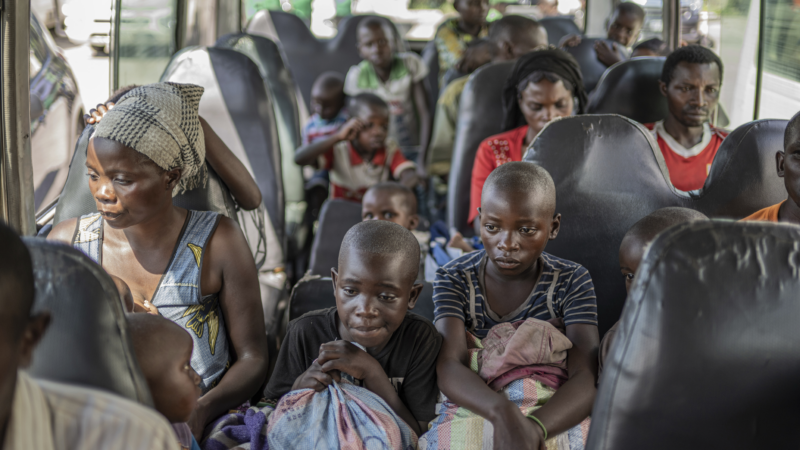Hundreds of Rwandans who fled to Congo after the 1994 genocide return home
GOMA, Congo — Hundreds of Rwandan refugees who were living in eastern Congo since the 1994 genocide in Rwanda were repatriated on Saturday, the U.N. refugee agency said, after Rwandan-backed rebels seized key parts of the region.
Most of the refugees were women and children, and 360 of them crossed the border in buses provided by Rwandan authorities and were escorted by the U.N. High Commissioner for Refugees, and aid group Save the Children, local authorities said. The goal is to repatriate 2,000 people, UNHCR said.
“We are happy to welcome our compatriots. They are a valuable workforce for the country’s development,” said Prosper Mulindwa, the Rwandan mayor of Rubavu, during a brief ceremony at the border.
The returnees were transported to a transit center where they will receive emergency assistance and support for reintegration.
They were among the hundreds of thousands of Hutus who fled Rwanda after the state-sponsored 1994 genocide that left up to a million minority Tutsis and moderate Hutus dead. Most had returned when Tutsi-led Rwandan troops first invaded Congo in 1996. But Rwandan authorities said thousands of Hutu militiamen and ex-soldiers had stayed and joined Congo’s army to destabilize Rwanda.
For decades, mineral-rich eastern Congo has been ripped apart by violence from government forces and different armed groups, including the Rwanda-backed M23, whose recent resurgence has escalated the conflict and worsened an already acute humanitarian crisis.
The rebels are supported by about 4,000 troops from neighboring Rwanda, according to U.N. experts.
Among the Rwandan returnees, personal testimonies highlighted journeys marked by exile and a deep connection to a homeland some have never known.
Nyirakajumba Twizere was born in 1996 in Congo and had never seen Rwanda.
“I never thought this day would come,” he said. “I’m finally going back to the land of my ancestors.”
The repatriation is based on a tripartite agreement between Rwanda, Congo and UNHCR that has been in place for more than a decade. According to Rwandan authorities, more than 101,000 refugees have already been repatriated, including 1,500 since the beginning of 2025.
‘Dawson’s Creek’ star James Van Der Beek has died at 48
Van Der Beek played Dawson Leery on the hit show Dawson's Creek. He announced his colon cancer diagnosis in 2024.
A Jan. 6 rioter pardoned by Trump was convicted of sexually abusing children
A handyman from Florida who received a pardon from President Trump for storming the U.S. Capitol on Jan. 6, 2021, was convicted on state charges of child sex abuse and exposing himself to a child.
A country-pop newcomer’s debut is your reinvention album of 2026
August Ponthier's Everywhere Isn't Texas is as much a fully realized introduction as a complete revival. Its an existential debut that asks: How, exactly, does the artist fit in here?
U.S. unexpectedly adds 130,000 jobs in January after a weak 2025
U.S. employers added 130,000 jobs in January as the unemployment rate dipped to 4.3% from 4.4% in December. Annual revisions show that job growth last year was far weaker than initially reported.
Greetings from Mexico City’s iconic boulevard, where a dog on a bike steals the show
Every week, more than 100,000 people ride bikes, skates and rollerblades past some of the best-known parts of Mexico's capital. And sometimes their dogs join them too.
February may be short on days — but it boasts a long list of new books
The shortest month of the year is packed with highly anticipated new releases, including books from Michael Pollan, Tayari Jones and the late Nobel laureate Mario Vargas Llosa.






